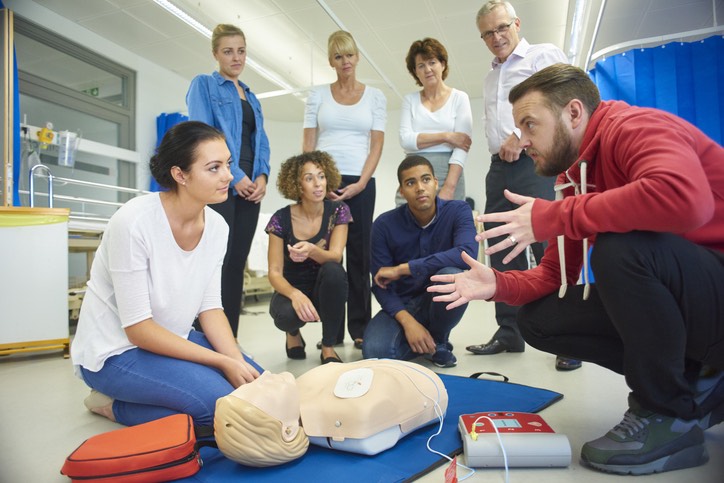What to Do After High School: 15 Alternatives to College

Parents, teachers, and teenagers may present college as the “thing to do” after high school but with every passing generation, this perception becomes less true. Don’t get me wrong, I went to university, earned a bachelor’s degree, and loved it. But that love was more for the experience and friendships than the education itself!
While some people, like my sister, enjoy academics enough to pursue a Ph.D., I’ve met many others, like my old boss and various other friends, who decided college wasn’t for them and have no regrets.
Today, society as a whole is a lot more accepting of different career paths and there is less pressure and discrimination against those that choose not to pursue a college degree. And there are so many other choices to consider, as we will cover below.
Ultimately, you must decide whether a four-year college is for you. Depending on your circumstances there may be many factors to consider, from the financial burden to the lack of guarantee of a degree or job at the end of it. On the other hand, studying a subject you love, gaining more independence, and being in a community of like-minded young adults can be freeing and life-changing. Going to college is a personal decision and only you can decide whether it is right for you. To help you out, here are some college alternatives to consider.
Related: My Son Doesn’t Want to Go to College: What Are Our Options?
1. Find a Job

An underrated option is to just go and get a job straight out of high school. If you just want to gain some professional experience, an entry-level job can be a great choice. You’ll get a paycheck, you’ll enter the workforce before others and you will learn on the job.
This doesn’t need to be a permanent choice and can also be done (part-time) alongside going to college. I worked as a waiter, bartender, and in a cinema after high school and it taught me a bunch of transferable skills and really opened my eyes to the service industry.
2. Take a Gap Year

Probably the best-known alternative to going directly to college, almost everyone will have at least one friend planning to take a gap year. The bad news is that taking a gap year doesn’t mean much in itself. You are taking a year out to pursue something else before deciding on your future.
Taking a gap year doesn’t necessarily look bad on a CV or hurt your employability as long as you actually do something during that time. Taking a gap year on your parents’ sofa isn’t really an option. People often associate gap years with travel abroad and/or volunteering. If you can afford months of travel across South East Asia or you can find a way to fund it yourself then it’s a great way to gain some life experience and consider your future later.
3. See the World

One of the most popular ways to fill a gap year, traveling is an exciting and enriching experience no matter the circumstances. Your financial situation may dictate how far, how long and in what conditions you can travel but there are many ways to make even a small budget last long, including working as you travel.
My wife and I quit our jobs to travel for 8 months before we started a family and it was one of the best things we ever did. Travelling, especially for long periods of time, only becomes harder as you grow older and pick up responsibilities. One important thing to consider is whether to travel solo, with a friend, or group of friends.
You also need to decide whether to visit as many places as you can or to enjoy a few places for longer periods of time. So many choices! Try to use your travels to work on other things: learn a language, take photos, write a blog. Not necessarily with a view to monetize them but just to try things out and discover what you enjoy doing.
4. Study Abroad

While study abroad programs that accept non-college students are sometimes pricey, they’re an enriching, amazing experience. Study abroad programs allow young people to take several weeks to a year within a more structured program to experience living in a different country, learn foreign languages, broaden their perspectives, and gain a sense of independence.
Join a group of high school graduates studying Art History in Italy or study Environmental Conservation across the South Pacific. If you have the budget this can be a great way to travel, learn, and meet people in a structured way that may be more reassuring for parents.
5. Volunteer

Another great way to fill a gap year, volunteering your time and effort to help make the world a better place can be a great next step after high school. Of course, by definition, you will not get paid for your volunteering so much like travel, your ability to pursue this may depend on your financial circumstances. Check out non-profits such as AmeriCorps, the Peace Corps, or VSO in the UK.
6. Build an Online Audience and Brand

This takes time and effort before you can start to earn from it but the possibilities are endless. These days you can write, take photos, and videos, sing, dance, or create other forms of content to share online on a variety of platforms. This does not mean becoming an influencer, although some may want to try their hand at that.
This is about creating interesting and engaging content to build an audience that is willing to subscribe and even pay to regularly view your content. Writing online is one option using platforms like Medium or Substack. Creating a YouTube channel or starting a podcast are other possibilities and there are many many more.
7. Build a Portfolio

Employers today pay more and more attention to candidates’ portfolios or previous bodies of work. In some industries, your portfolio can have more influence on your career opportunities than your CV and job experience. If you are interested in software development then contribute to Open Source projects or create, build, and share code on public platforms like GitHub. If you are into graphic design then share your designs on Dribbble. If you’re into Data Science then complete challenges on Kaggle.
If you have a broad set of interests then spend some time answering questions on Quora.
Whatever your interests or industry, build something for yourself or for others, find the best platform to showcase it, and share it with the world. You can prepare for this or complement this by taking any of the many free online courses available across topics and industries.
8. Freelance

With the democratization of the Internet and home WiFi, the barriers to reaching an audience of potential customers have come tumbling down. These days anyone can open up a shop on Etsy and sell anything from homemade jewelry, art, clothes, toys, books, and furniture. Anyone can create a profile on Fiverr and get gigs writing, translating, drawing, designing, editing, animating, programming, and more.
Anyone happy to do more hands-on work can get on TaskRabbit and get paid to help people move homes, clean, garden, assemble furniture, or deliver goods. Take something you like doing and get paid to do it. Start with a low initial price and increase it as you get experience and happy customers. You don’t need to commit to these things for years, you just need to give it a few months to build a reputation and a good profile on your platform of choice.
9. Start a Business

Founding a business offers many of the same advantages as freelancing but is more of a commitment. Instead of picking up freelancing gigs, you build your own business by incorporating a company, alone or with friends or family, aiming to deliver a specific type of product or service.
Creating a Limited Liability Company has advantages and disadvantages so it is something to consider. As always, you need to decide what is best for you and your specific circumstances.
10. Get an Internship

These can be competitive and you need to choose who to apply to but internships can be a great way to get your foot in the door of a professional workplace to gain some valuable experience and decide whether it is a good fit for you. Internships often lead to offers of permanent employment, which is a great option to have if you do end up liking it. Cast your net far and wide, internships are not always paid and some are more targeted to graduates but many are open to teens just out of high school. They can last anywhere from a few weeks to a year—but anything under a month will not really help you get a feel for the role or company.
11. Become an Apprentice

Like an internship, an apprenticeship will allow you to gain some experience in a particular role, company, and industry. There are a few key differences: Apprenticeships normally have a longer time frame, anywhere from 1 to 4 years.
An apprenticeship will lead to a qualification whereas an internship will give you work experience. Apprenticeships are always paid and you will benefit from training from your employer as well as from the apprenticeship provider. You are also more likely to receive a permanent employment opportunity upon completing an apprenticeship.
12. Go to Community College

Unlike traditional colleges, getting a degree from a community college is normally a 2-year affair, with lower overall fees and admission requirements and smaller classes that are more focused on local communities. After these two years, some students will choose to transfer their credits to a four-year school or graduate and follow more vocational programs that lead to certification, diplomas, and associate degrees.
13. Get Vocational Training

There are different types of vocational schools: technical colleges and the more hands-on trade schools that allow students to complete programs in 1-2 years without learning ancillary or “core” topics and curriculum. The learning is strictly focused on the knowledge and skills needed for the specifically targeted job and career. Training programs will help you directly gain the skills you need for the job you want.
14. Get Certified in a Skill

If you are a high school student with an early interest in a specific profession then you may be able to go out and get the relevant certifications and just start! Not that some professions may have additional prerequisites.
In the United States, you can become a personal trainer right out of high school by completing AED/CPR certification and passing a certification examination from one of the major certifying bodies, such as the National Academy of Sports Medicine. In London, you can directly apply to join the London Fire Brigade out of high school as long as you have a driving license.
15. Serve Your Country

I almost took a gap year to serve in the UK military, getting as far as passing the British Army Officer Selection Board. My family has a history of service and although I had no particular interest in the military my dad quite convincingly sold it to me as taking a year to get paid to learn to drive, get fit, parachute, and learn a bunch of cool things.
In the United States, I don’t believe this type of program exists and you need to fully enlist, taking into consideration the minimum service of 4 years of active service—this is a very serious choice with minimum commitments that should be carefully considered. You can also look into the Reserves or National Guard which also require part-time multi-year commitments.
What Is the Best Choice After High School?
The best choice after high school varies for each individual, contingent on their aspirations, academic performance, and practical circumstances. For some, pursuing higher education at a university or college can provide valuable knowledge, skills, and a pathway to career opportunities.
Others may find that vocational training or apprenticeships align more closely with their career goals, offering hands-on experience and a quicker entry into the workforce. Alternatively, taking a gap year can be beneficial for personal growth, providing time to explore interests, travel, or gain work experience.
Ultimately, the best post-high school path is one that aligns with the student's personal goals, learning style, and long-term career aspirations.

